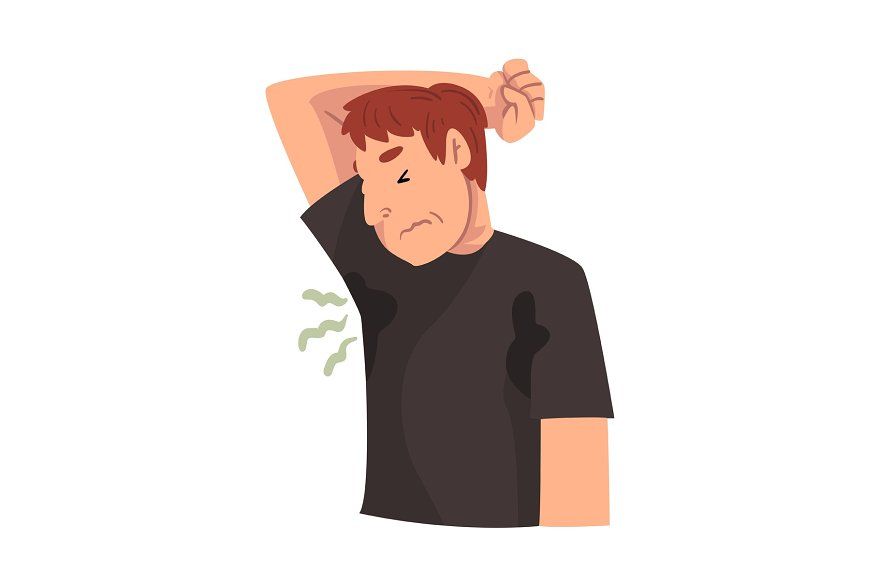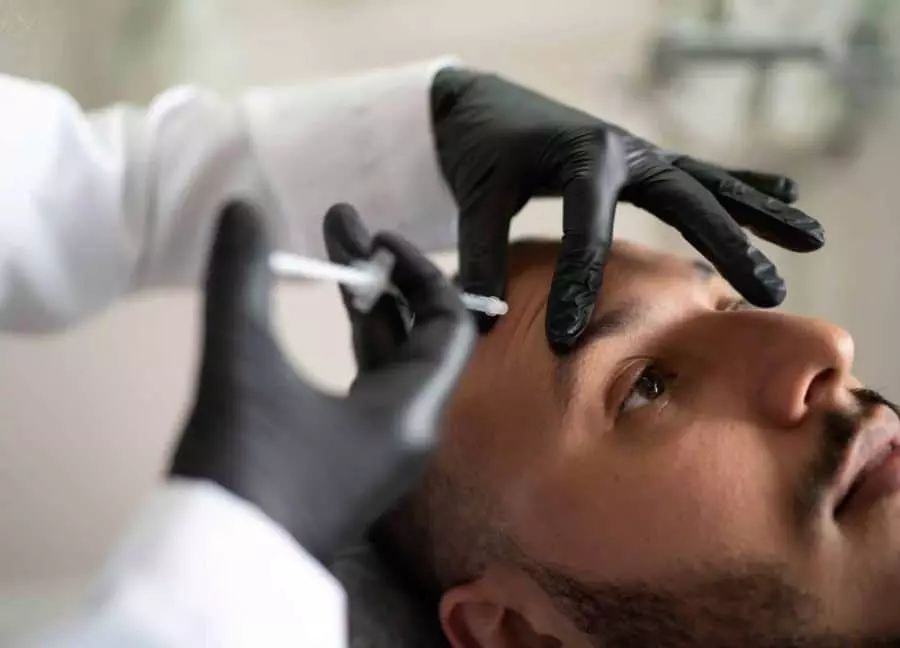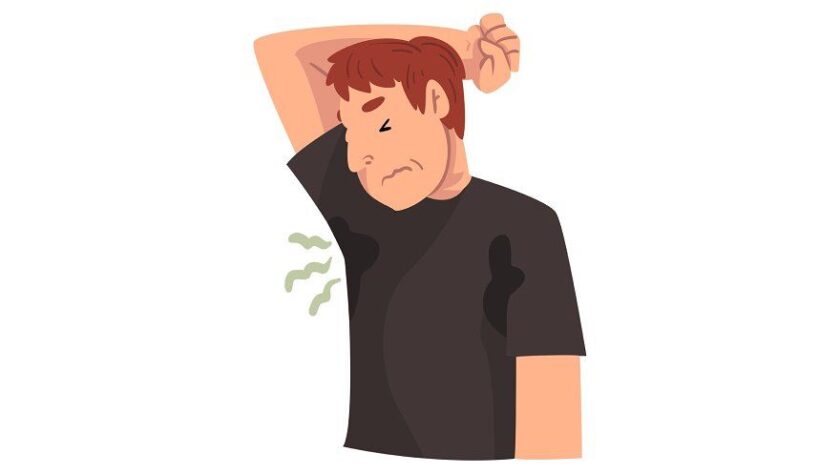OVER VIEW
Contents
Excessive sweating or hyperhidrosis is a condition where the sweat glands overreact and produce more sweat than necessary, which is seen in many peoples.
It is usually seen in the most active regions of sweat including:
- Palm
- feet
- face
- armpits this is due to the high numbers of sweat glands in these areas.
However, sweating is good to control body heat, flash out unwanted bacteria, etc.
But excessive sweating, which is also seen in cold climates and is definitely a problem.
Nearly 5% of the population suffers from hyperhidrosis, and thousands more live undiagnosed.
Women have more sweat glands, compare to men’s, but men’s sweat glands are more active than women’s, so men tend to sweat more.
The doctor may help you by giving antiperspirants, with some other treatments.

1. Types
Hyperhidrosis has two main types – primary, and secondary hyperhidrosis.
Primary or focal hyperhidrosis
Primary or focal hyperhidrosis usually starts during adolescence or childhood. This type may be divided by the area affected including:
- Palmo planar hyperhidrosis – excessive sweating of the hands or feet
- Axillary hyperhidrosis – sweat from underarms
- Gustatory hyperhidrosis – sweating of the face and chest
Primary focal hyperhidrosis does not cause illness, and about 1 to 3% of the world’s population is affected by it.
Secondary hyperhidrosis
This type of hyperhidrosis is more linked to medical conditions, like diabetes, thyroid issue, tumor, hormonal changes, etc.
2. Causes of excessive sweating
However, the cause of primary hyperhidrosis is unknown, although some experts claim it is because of overactive nerves (which are responsible for signaling the sweat glands).
Possible cause of primary hyperhidrosis
- Run by families or genes
- emotional Stress and nervousness may cause excessive sweating
Some people seem to be born with this condition, while others may sweat too much because of anxiety.
Causes of Secondary hyperhidrosis
This type comes in underlying medical conditions that can cause by:
- Anxiety conditions
- spinal cord injury
- Obesity
- Alcohol
- Diabetes
- Overactive thyroid
- Certain cancer include lymphoma, pheochromocytoma, carcinoid, and tumors
- Menopause
- Certain foods like spicy, processed, junk food, etc.
- During pregnancy
- Tumor
- Parkinson’s disease
- Stroke
- Febrile diseases
- Tuberculosis and other types of infection like HIV, malaria
- Certain medicines
Learn More – Top 8 Reasons For Excessive Sweating? Explanation
3. Signs and Symptoms
Hyperhidrosis may affect your daily life routine, this problem even gets worse for many sufferers. So seek immediate medical help if heavy sweating is accompanied.
Here are some most seen signs and symptoms include:
- Frequent sweating
- The wet palm of the hands and feet
- Sweating even in normal condition
- Footprints due to sweat on a clean floor
People who suffer from this condition may experience
- Skin problems like fungal, and bacterial infection
- Irritating
- Reducing in self-confidence
- Spending more time cleaning sweat, which is so irritating
- Not getting jobs in the army
- Dehydration may also be seen, due to excessive water coming out.
- Body odor
- Less social interaction
So make sure, to talk to your doctor, especially if it interrupts your daily life routine.
4. Why do Some people More Sweat – Than Others?
As we know that sweating is necessary, which absorbs heat from our body, and evaporates, thus helping us regulate our body temp.
However, during physical exercise, and exceptional situations, such as a hot day, it is okay to sweat more than usual.
But is not okay with more sweat in normal conditions.
There is some reason why some people sweat more than other are:
- Genetic, which seen in some people
- What you eat – for example – spicy food eating people more prone to sweat more.
- Fitness level, If you are not that fit, you seem to sweat a little bit more because your body takes more effort to cool down.
- Feel nervous
- Caffeine in coffee and Nicotine in cigarettes also makes some people sweat more than other people.
That is why men tend to sweat more than women.
5. How is Doctor’s Test?
To diagnose this condition, a dermatologist takes the patient for a physical exam. this include
- Medical history
- asks about your sweating, such as location, and time.
- look closely at the areas of the body where sweating more
- does the sweating occur when you feel nervousness, anxiety, and any traumatic event
- how often do you change your clothing?
- any other symptoms can help the doctor to diagnose your sweating
Visible signs of sweating may be noted during a visit to a healthcare provider but Sometimes medical testing is necessary. which include:
- Blood test, if a person suffers from any disease
- Sweat test, In this, a person is applied on the person’s skin which turns purple when wet.
These all tests estimate the severity of your condition.
6. How To Overcome It?
If this situation arises from any underlying condition, so the doctor may treat the disease first, if no cause is found, then the goal is to overcome excessive sweating.
Treatment for overcoming more sweating includes:
1. Clothes – Wear cotton, clean and loose clothes, which absorb sweat more, and shower regularly to keep the body temperature as cool as possible.
2. Antiperspirant – which has 10 to 20% aluminum in it.
When Antiperspirant spray is applied to the sweat gland, through which the sweat comes onto the skin from a gel-like substance.
NOTE: This gel blocks the sweat gland preventing the sweat from coming onto the skin.
If there is no sweat for the bacteria to eat, so there will be no more odor.
Normally it takes around three to five days to see improvement.
3. Deodorant – It makes the environment too acidic or too salty for the bacteria to eat. thus, preventing the production of sweat and odor.
However, some research suggests that some deodorants and antiperspirants contain toxic components.
7. Treatment of excessive sweating

If the home remedy or overcome process is not working as they saw, then talk to the doctor, which will prescribe you some other treatments.
Prescription medicines called anticholinergics, are used in both focal and generalized hyperhidrosis and are taken by mouth. Also have side effects.
If hyperhidrosis is seen worse during public speaking, stage performances, and special events, then taking an anticholinergic medicine before the event may be helpful.
Botulinum toxin injection
This injection temporarily blocks the nerves that stimulate sweating which has some side effects including:
- Flu
- weakness
- little pain
This toxin is used to treat severe underarm, palmar, and plantar sweating.
Iontophoresis
In this process, the hands are placed in water, and then a gentle electric current is passed through the water.
One trial found it reduce sweating by about 80%
Surgery
In this, the surgeon cuts, burns, or clamps the nerves that carry messages to the sweat glands. it is usually recommended in severe cases.
Its satisfaction rates above 80% have been reported, and are higher for children (4).
8. Risk
Its risk may be higher in people who do not take complete treatment for hyperhidrosis. this lead to complications are:
- Skin and nail infection
- Bacteria infection which causes dandruff, hair fall, dry hair, etc
- Skin growths are caused by HPV (human papillomavirus).
- Rashes, itchy, and red skin
- Can impact life, job, relationship, and confidence.
9. When To Talk To The doctor?
Call your doctor, if you face these kinds of problems:
- If you face night sweating, then talk to the doctor
- If your sweating is seen in the overall body, not just in 1 or 4 body parts.
- Sweating from one side of your body, like one armpit.
- If your sweating sudden gets worse
- Sweating with weight loss
- If there is excessive sweating after starting any medicine.
- Feel the pressure in the chest area, and any discomfort. These may be a sign of a medical condition, so talk to the doctor.
- If this is bothering you or interfering with your life.
Sometimes, the causes of hyperhidrosis can’t be cured. Or you may be taking that medicine that’s causing excessive sweating as a side effect.
Even many, experts say that excessive sweating is something that people don’t take seriously enough.
BOTTOM LINE
If this situation arises from any underlying condition, so the doctor may treat the disease first, if no cause is found, then the goal is to overcome excessive sweating.
Secondary hyperhidrosis is more linked to medical conditions, like diabetes, thyroid issue, tumor, hormonal changes, etc.



